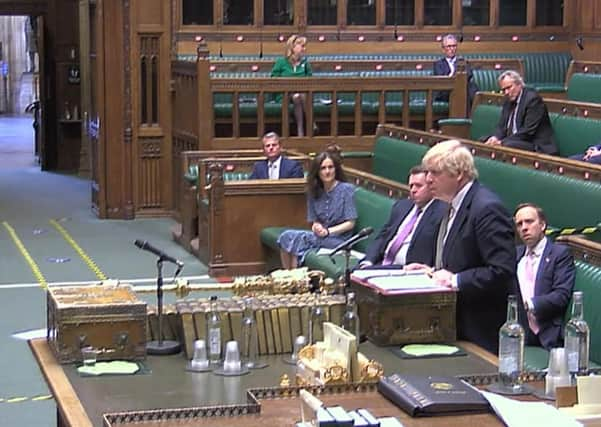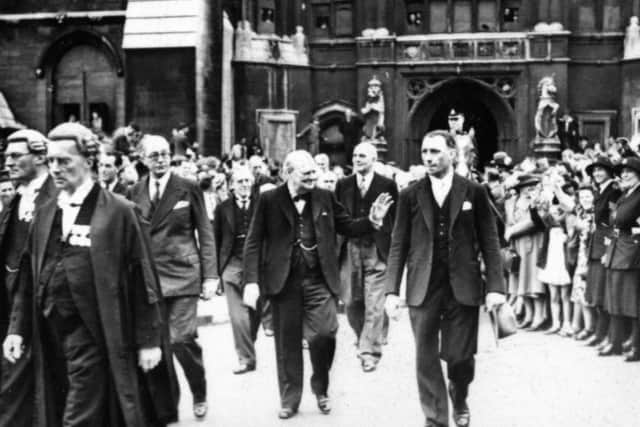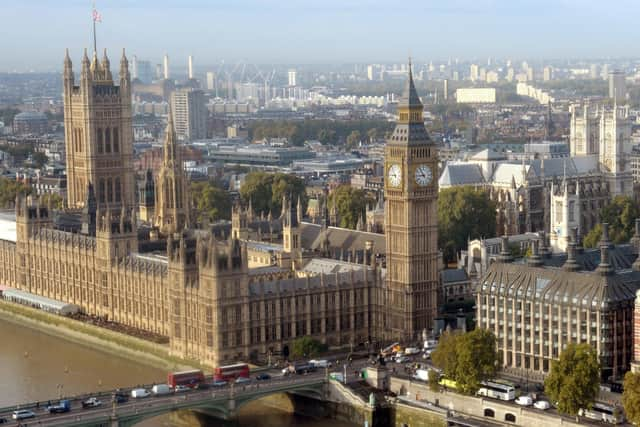Pandemic is no defence for sidelining Parliamentary scrutiny – David Blunkett


Were we living in normal times, we would have also been coming to terms with local elections across the region which – for fairly obvious reasons – were cancelled.
Yet it is also an opportunity to reflect on the growing challenges facing local government and the delivery of services.
Advertisement
Hide AdAdvertisement
Hide AdFifty years ago this week, I was first elected to Sheffield City Council and 40 years ago I became its leader.


The power of local government in all kinds of ways has been eroded, and with it confidence in the local democracy, which would have played an essential role in joining up the dots, driving collaboration and providing a voice for local people in getting to grips with coronavirus.
Behind the scenes, of course, local government has played an essential role, not least in keeping some absolutely vital services such as waste collection and disposal running, preventing an even bigger health catastrophe than we have already.
Those still at work in local government deserve much more of an accolade than they’ve received so far. It is difficult to be two metres apart when you’re in a refuse collection lorry, and you are dealing with the increased volume of our leftovers, as we manage at home when previously we might have been out and about in restaurants, cafés and bars.
Advertisement
Hide AdAdvertisement
Hide AdBut ‘localism’ has been cut out of the Government’s agenda. In a practical sense, the excellent work and experience of local Directors of Public Health has not been utilised to the full.


With a bit of creative thinking, a framework could have been developed weeks ago to which those local directors could have responded in setting up test and trace.
In my own city of Sheffield, testing had already been developed at a much earlier phase of the virus than in other parts of the country, and this could have been utilised effectively.
However, it is the massive over-centralisation, which in the first phase appeared to all of us to be necessary, that now concerns me most.
Advertisement
Hide AdAdvertisement
Hide AdI fear that our normal processes of democratic accountability are really struggling to maintain a foothold in any meaningful sense. In effect, power has shifted quite dramatically into the hands of a few, advised by even fewer.
The House of Commons, supported gallantly by staff in the Palace of Westminster, particularly those dealing with technology, has regained some semblance of operation after the prolonged Easter lockdown.
It is true that work on committees can be dealt with reasonably effectively ‘online’ and that to some degree, but without the shouting, Prime Minister’s Questions has functioned.
But, honestly, the functioning of our Parliament is more in the wish than the reality. There is no effective debate, and speeches are delivered into a black hole. Technology is not the panacea to all our current ills.
Advertisement
Hide AdAdvertisement
Hide AdIt malfunctions, it leads to distortions and it is not the same as challenge and debate – even with distancing – in the Chamber.
Whether you like the idea of having a second Chamber or not, the House of Lords is a key part of our constitution, but at the moment it is hardly functioning as an effective check on the Executive.
Peers are blocked from attending the Chamber. Not so much a lockdown as a ‘lockout’.
The result is pretty simple. Whilst Parliamentarians can raise questions, they have a hell of a job following them up.
Advertisement
Hide AdAdvertisement
Hide AdWhilst some ministers have been assiduous in recognising the danger of an overbearing Executive, and therefore the threat to democracy itself, others make no secret of their contempt for even maintaining the most basic functioning of our Parliamentary democracy.
None of this was true in the Second World War. Even in the most critical of moments, including when the Palace of Westminster was hit by the Luftwaffe, Parliament continued to sit and to function.
At this very moment when the Government has begun to show its hand in disclosing the gradual emergence of a recovery programme from the pandemic, we need an effective democracy more than ever. The continuing use of emergency powers, their sometimes arbitrary and authoritarian application, must be challenged.
Whilst daily press conferences might, in the very early stages of the infection, have been necessary, and informative, they now serve to promote the profile of individual Cabinet ministers and act as a substitute for the cut and thrust of a participative, responsive and responsible Parliament.
Advertisement
Hide AdAdvertisement
Hide AdThe most blatant example is Boris Johnson making a Prime Ministerial statement tomorrow night to the nation, not to the House of Commons, but on television and radio.
Implementation from Tuesday would clearly make no difference and is a complete abuse of power.
At the heart of the crisis, it would have been undoubtedly necessary for authority to be delegated to Ministers to act decisively.
But coming out of lockdown, and developing effective measures to offer hope of both social and economic recovery, must be accompanied by a full restoration of democratic government at Westminster, and genuine democratic engagement at local level.
Advertisement
Hide AdAdvertisement
Hide AdWhat was good enough between 1939-45 is good enough in the year 2020.
And 50 years on from my first foray into elected politics, I believe just as strongly in the power of democracy, in providing legitimacy for actions taken on our behalf, and to hold the powerful to account. We should expect nothing less.
David Blunkett is a Labour peer and former Home Secretary.
Editor’s note: first and foremost - and rarely have I written down these words with more sincerity - I hope this finds you well.
Almost certainly you are here because you value the quality and the integrity of the journalism produced by The Yorkshire Post’s journalists - almost all of which live alongside you in Yorkshire, spending the wages they earn with Yorkshire businesses - who last year took this title to the industry watchdog’s Most Trusted Newspaper in Britain accolade.
Advertisement
Hide AdAdvertisement
Hide AdAnd that is why I must make an urgent request of you: as advertising revenue declines, your support becomes evermore crucial to the maintenance of the journalistic standards expected of The Yorkshire Post. If you can, safely, please buy a paper or take up a subscription. We want to continue to make you proud of Yorkshire’s National Newspaper but we are going to need your help.
Postal subscription copies can be ordered by calling 0330 4030066 or by emailing [email protected]. Vouchers, to be exchanged at retail sales outlets - our newsagents need you, too - can be subscribed to by contacting subscriptions on 0330 1235950 or by visiting www.localsubsplus.co.uk where you should select The Yorkshire Post from the list of titles available.
If you want to help right now, download our tablet app from the App / Play Stores. Every contribution you make helps to provide this county with the best regional journalism in the country.
Sincerely. Thank you.
James Mitchinson
Editor
Comment Guidelines
National World encourages reader discussion on our stories. User feedback, insights and back-and-forth exchanges add a rich layer of context to reporting. Please review our Community Guidelines before commenting.